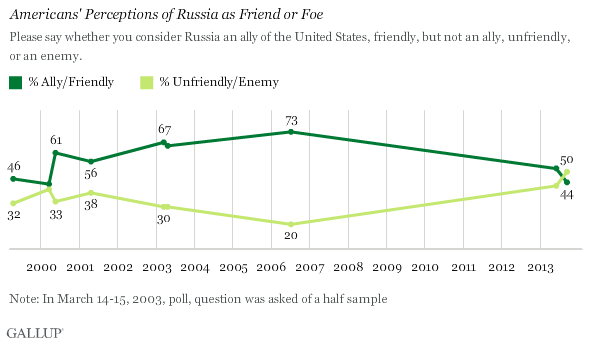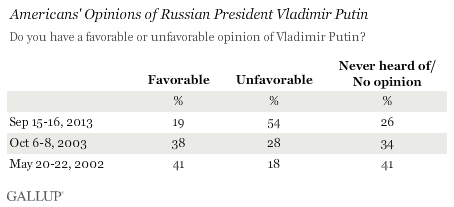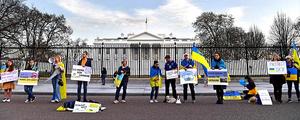WASHINGTON, D.C. -- More Americans view Russia as unfriendly or an enemy of the United States than as an ally or friendly nation for the first time in 15 years, marking a significant change from as recently as June of this year. A majority of Americans view Russian President Vladimir Putin unfavorably for the first time since he originally took office in 2000.

The Sept. 15-16, 2013, survey was conducted shortly after Russia and Putin helped broker a deal to rid Syria of chemical weapons, averting U.S. military action against Syria.
Since 1999, Americans have considered Russia more of an ally or a friendly nation than an unfriendly nation or an enemy. As recently as June of this year, 52% of Americans considered Russia an ally or friendly; yet three months later, that number has dropped to 44%, with 50% believing Russia is now unfriendly or an enemy of American interests.
The more negative views of Russia come after a series of international events involving Russia, including not only the conflict in Syria, but also Russia's granting former NSA contractor Edward Snowden temporary asylum, and its new restrictions on gay and lesbian rights. Additionally, President Putin published an op-ed in the New York Times last week, chastising American foreign policy and suggesting that U.S. President Barack Obama's statement of American exceptionalism was "extremely dangerous."
Belief that Russia is an ally or a friendly nation is down from a peak of 73% in 2006, during Putin's second term as president. He was constitutionally barred from serving a third consecutive term in 2008 and stepped down, serving as prime minister from 2008 to 2012. In 2012, Putin was once again elected to the Russian presidency.
Americans Also Souring on Putin
Americans' opinions of Putin are declining as well. Currently, 19% view Putin favorably, while 54% hold an unfavorable opinion of him.
This is a marked contrast to Gallup's prior readings on Putin, conducted nearly a decade ago during his first term as Russian president, when Americans were on balance positive toward him. Americans' current net-negative views of Putin are notable, given his effort to communicate directly with the public and put himself in a positive light in the New York Times op-ed piece.

Despite the increasing negativity toward Russia and Putin, Americans widely endorse the Russian plan to rid Syria of chemical weapons, and believe Putin's involvement was helpful. Seventy-two percent approve of the plan and 18% disapprove. And 50% say Putin's involvement was mostly helpful to U.S. interests, while 36% say it was more harmful.
Russia Receives Low Marks on Snowden, Gay and Lesbian Policy
The increasing negativity toward Russia suggests that matters such as the Snowden asylum case and Russian policy toward gays and lesbians may weigh more heavily on Americans' minds than Russia's recent role in the negotiations on Syria.
The same poll finds that 64% of Americans who have heard of Russia's granting asylum to Snowden disapprove of the move, while 25% approve of its actions.
Also in June, the government passed a law that would restrict "propaganda" relating to gays and lesbians in Russia and has led to the arrest of gay activists in the nation. While 45% of Americans have not yet heard of these developments, of those who said they were aware, 69% disapprove of Russia's policies toward gays and lesbians, while 13% approve.
Bottom Line
Since Vladimir Putin ascended to the Russian presidency in 2000, he has had a complicated relationship with the American public. While never wildly popular with Americans, he was viewed more positively than negatively earlier in his time in office, and this mirrored Americans' opinions toward the nation he leads.
Despite proposing a plan to ensure international control of Syria's chemical weapons -- a plan Americans view favorably -- Americans are much more negative toward Putin than in the past, and are less likely than they were three months ago to view Russia as friendly to the U.S.
The data suggest Russia's more aggressive posture on the world stage in recent months has not gone over well with Americans, despite Putin's obvious interest in his image among Americans. With Russia poised to host the Winter Olympics in February 2014, it is clear that the nation -- and its leader -- will continue to influence worldwide debate for the foreseeable future.
Survey Methods
Results for this Gallup poll are based on telephone interviews conducted Sept. 15-16, 2013, on the Gallup Daily tracking survey, with a random sample of 1,010 adults, aged 18 and older, living in all 50 U.S. states and the District of Columbia.
For results based on the total sample of national adults, one can say with 95% confidence that the margin of sampling error is ±4 percentage points.
Interviews are conducted with respondents on landline telephones and cellular phones, with interviews conducted in Spanish for respondents who are primarily Spanish-speaking. Each sample of national adults includes a minimum quota of 50% cellphone respondents and 50% landline respondents, with additional minimum quotas by region. Landline and cell telephone numbers are selected using random-digit-dial methods. Landline respondents are chosen at random within each household on the basis of which member had the most recent birthday.
Samples are weighted to correct for unequal selection probability, nonresponse, and double coverage of landline and cell users in the two sampling frames. They are also weighted to match the national demographics of gender, age, race, Hispanic ethnicity, education, region, population density, and phone status (cellphone only/landline only/both, and cellphone mostly). Demographic weighting targets are based on the March 2012 Current Population Survey figures for the aged 18 and older U.S. population. Phone status targets are based on the July-December 2011 National Health Interview Survey. Population density targets are based on the 2010 census. All reported margins of sampling error include the computed design effects for weighting.
In addition to sampling error, question wording and practical difficulties in conducting surveys can introduce error or bias into the findings of public opinion polls.
View methodology, full question results, and trend data.
For more details on Gallup's polling methodology, visit www.gallup.com.
